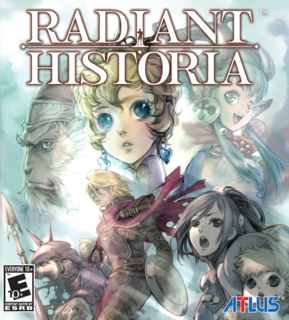This evolution of the aloof and loner hero into something more is a quite enjoyable ride through time.
The story opens up with two figures standing in the middle of a desert muttering about they failed again and need to correct their mistakes. It shifts to the game's present day and introduces our loner and aloof spy hero, Stocke. Stocke is getting ready to go on a mission, to escort another spy with valuable information, with new subordinates Raynie and Marco. However, things go terribly wrong and Stocke receives terrible injuries with the net result of him gaining the ability to traverse time, space and two alternate realities with the ultimate goal of saving the world and eventually molding Stocke into one of the more interesting protagonists from a JRPG in a while.
The time travel mechanic is like a fusion between how time and space travel works in the Chrono series and the in-game plot synopsis from Odin Sphere. Using the magic book, the White Chronicle, at specific points Stocke can record events and return to them later in gameplay. Enough justification from the exposition characters in the "dimension-between-dimensions" is given to solidify a fairly believable story with time-travel, as well.
There's standard fare for JRPGs here as well, including town exploration and ransacking homes and dungeons for treasure chests. However, there is only one chest per given location, i.e. you can't open it in the future, then travel back and open the chest again. Exploration is generally limited to the area pertinent to the story at the moment. Most of the exploration, thus, will be done by unlocking the various nodes of travel through the White Chronicle and seeing the changes that happen throughout the continent of Vainqueur during the game.
The combat in Radiant Historia is an addicting element to the game. It looks like a standard turn-based combat system at first, but there are enough tweaks made on that formula to heighten it above the average system. On the top screen the next 10 turns of characters and/or enemies are displayed with the active selection being number 1. Everything else takes place on the touch screen. Player characters have normal commands like attack, skills, items, defend and run. The two main differences in commands are change and mana gauge. Mana gauge, though, is a limit break with each character starting off only being able to erase an enemy turn, but through plot events can gain more uses for the gauge.
The change command comes into play with how the enemies are setup in battle. Enemies, with seven active at most, occupy a 3x3 grid and various skills the characters use can shift the enemies from point to point. The main goal of this is to shift enemies onto each other to keep a combo counter going. The higher the number of combos, the more damage you do and the more loot, gold, and experience is gained from doing high combos. Change comes into play by shifting enemy and player turns around to maximize the number of hits in a combo, which can also be used with the mana gauge to eliminate enemy turns. It's possible to make it through the standard fights not relying too heavily on these combos, but it almost negates the need for grinding because of the bonuses for doing well in this combat setting.
The sound design can come across as a mixed bag. In general the sound effects for spells and combat are unimaginative at best and also hampered by the DS's sound capabilities. The music however, is superb and fits very well with the game, evoking the appropriate emotions for each scene. There are no voices for dialogue. The game requires a fair amount of reading, but there are times when the characters will say the same things over and over again when it isn't necessarily appropriate, a particularly notable scene for this is after defeating the final boss. The choice to do away with the inclusion of voice actors was a good one, in that it allows for the player to be more involved with the story. The player can craft the voices for each character and how their tones would change depending on what's happened and what's important at the time.
Radiant Historia is a strong JRPG for the DS. The major points for the game lie in the strength of its story's feel, combat and music. The points that could have used a little bit more work would be on more detailed sprites for the field and a trusty editor's hatchet for the particularly verbose scenes. Knowing Atlus, though, it's a better idea to get this game sooner rather than later because of generally fewer copies being produced.

